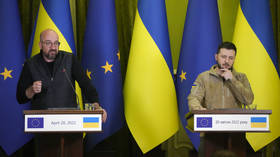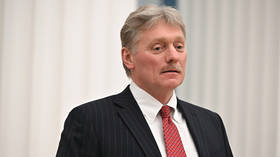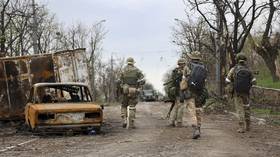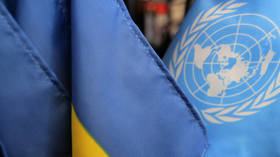EU reveals when it will respond to Ukraine’s membership bid

Charles Michel visited Ukraine on Wednesday, meeting the country’s President Volodymyr Zelensky. The European Council President reiterated the bloc’s financial, military and political support for Kiev amid its conflict with Moscow, revealing also when the EU will respond to Ukraine’s membership bid.
“Usually, it takes eight months for the Commission to publish an opinion. We are in close contact on the substance. We will have the opinion of the Commission by the end of June,” Michel said during a joint press conference with Zelensky, adding that he feels “a very strong support” towards Ukraine’s EU membership drive.
Joining the EU has been among the central talking points for pro-Western Ukrainian politicians for decades already, yet little to no actual progress has been achieved. The process became reinvigorated amid the Russian invasion that began late in February, with Zelensky repeatedly urging Brussels to take the country in.
Early in April, European Commission President Ursula von der Leyen delivered a special questionnaire, the first step toward a country formally becoming a candidate for EU membership. Kiev submitted the first part of the application less than a week after receiving the document.
Apart from supporting Ukraine’s EU membership drive, Michel reiterated continuous financial and military support for the Kiev authorities. The official openly stated the bloc wants Kiev to beat Moscow in the battlefield.
“Now we have a total of 1.5 billion euros of military equipment, and day after day in close consultation with you, we are trying to convince member states to add bilateral support to make sure that what we provide is what you need,” Michel stated.
We are determined to do everything we can to support Ukraine because we want victory for Ukraine. And that is why we will use all the possible tools in our hands.
The EU council chief also touched on the alleged war crimes that Kiev blames on Russian troops. Moscow, however, has denied any such wrongdoing, accusing Kiev of staging a “provocation” to frame the country’s military.
Earlier in the day, Michel toured Kiev’s northwestern suburbs, from where Russian troops withdrew late in March, sharing his impression of what he had seen during the news conference.
“This morning, I went to Borodyanka to witness with my own eyes the situation on the ground. I met the people. There are no words to explain what I feel, not as President of the European Council, but as a father, as a human being. These are atrocities. These are war crimes. They must be punished. It will be punished,” he said.
Kiev and its suburbs have become hotspots for European politicians lately with top officials flocking there to show their solidarity with Ukraine. The location has been visited by European Commission President Ursula von der Leyen, the top EU diplomat Josep Borrell, as well as British Prime Minister Boris Johnson and Austrian Chancellor Karl Nehammer.
Russia attacked its neighbor following Ukraine’s failure to implement the terms of the Minsk agreements, signed in 2014, and Moscow’s eventual recognition of the Donbass republics of Donetsk and Lugansk. The German and French brokered Minsk Protocols were designed to give the breakaway regions special status within the Ukrainian state.
The Kremlin has since demanded that Ukraine officially declare itself a neutral country that will never join the US-led NATO military bloc. Kiev insists the Russian offensive was completely unprovoked and has denied claims it was planning to retake the two republics by force.















